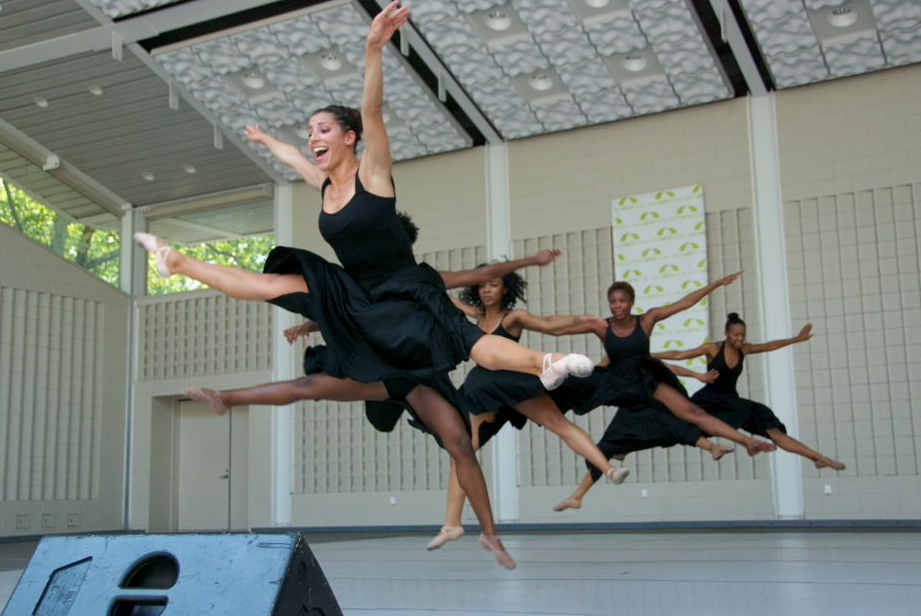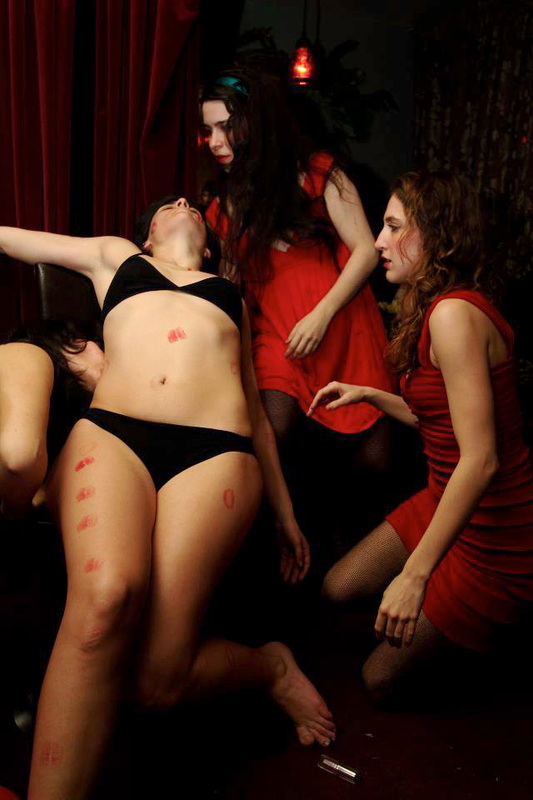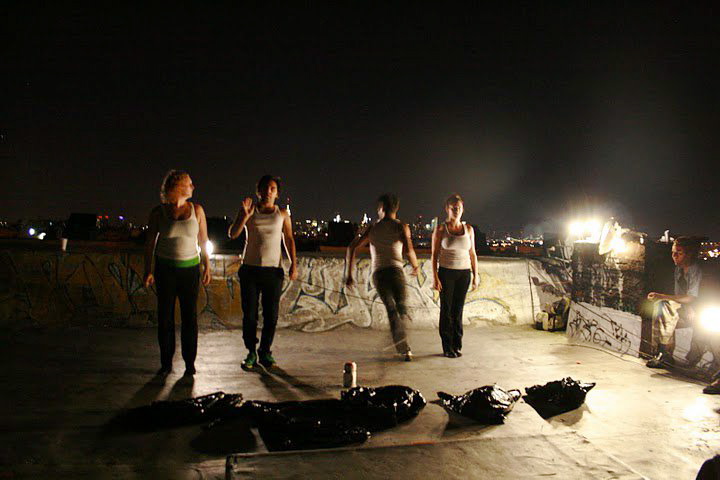|
Jacqueline Lawton: Give us a little background on where you’re from originally, where you grew up, and how you ended up where you are now…
J.J. EL-FAR: I think I have always known that I was an artist. I grew up in a little Easter egg of a town in Massachusetts that no one has ever heard of. My first big hits were plays I wrote or adapted from my favorite books and directed in my basement with all my cousins and neighbors. They were thrilled when I finally joined a community theater and stopped forcing them to rehearse in a dank basement in the middle of the summer. I guess having a big family was one of the benefits of having an Irish Catholic mom and Jordanian dad. My life is kind of like an elongated and less funny version of my big fat Greek (Arabic) wedding. I have something like 40 first cousins and not a single one of them has ever dreamt of becoming a vegetarian. Then I threw everyone for a loop and went to Brandeis University, (a.k.a Jew U). I’m pretty sure they took me because they figured a Catholic Arab girl was like two birds with one stone or something for their diversity quota. At college I started the Free Play Theater Cooperative, the only company on campus making experimental work with free admission to all the plays. I studied acting and performed in a bunch of plays, including one truly awful play by Theresa Rebeck (no offense, Theresa- you’ve done much better work since) which required me to play a hoop-skirt wearing Octaroon. Yep. We now refer to that as “the play which shall remain unnamed.” I also was the production stage manager for the Bernstein Festival of the Arts, and I started a Playback Theater troupe on campus. JL: Why did you decide to get into theater? Was there someone or a particular show that inspired you? JJE: Well, there was one point when I was 12 when I had my dance recital and the production of the play I was in on the same night and I finally had to choose between them (I was a pretty hard core dancer for a while) and I picked the play. I’ve never stopped picking the play since. During my junior year at college I went to a reading of Betty Shamieh’s The Black Eyed at Harvard and was swept away by the play. I told Betty I wanted to do it at Brandeis and she agreed. I couldn’t decide which of the four female characters I wanted to play, so I decided to direct and that project became my thesis. The play stirred up a lot of controversy on campus, as you can imagine, and I had professors of Judaic studies emailing me pages upon pages of why the play was anti-Semitic and anti-Israel. I was pretty sure there would be picketing outside the theater. I also cast a black actress in the featured role as a suicide bomber, which stirred up all sorts of further ruckus. As it turns out, controversy makes great publicity- a lesson I still live by to this day. I remember my acting teachers coming up to me after the sold out performances saying “You’re a director! That’s why you didn’t pay attention in my class!” I said to them, “I wasn’t paying attention to the bad acting, I was paying attention to how you fixed it.” A good friend of mine brought his Russian immigrant Jewish, very Zionist mom to the production. She sat behind me during the play and I remember listening to every sound she made. At the end she approached me and very slowly said, “I normally don’t like this type of play, but that was... very very good.” That was probably the best complement I have ever received. JL: What is unique about being an artist where you live? JJE: It’s a really exciting time to be an artist in Harlem. There is a second renaissance happening with so many cultural things happening all the time it’s hard to keep up. Like anywhere else there is very much a scene here, and the movers and shakers are people like George Faison, Tony award winning choreographer and dancer, and Maya Angelou, and Mikki Shepard at the Apollo. There is also a new generation of artists, which I include myself in who are interested in preserving the traditions of Harlem, but mixing things up, bringing in fresh perspective and showcasing new talent and ideas. It’s also affordable for an artist to live in Harlem. I think that my neighborhood is a rival for Brooklyn as an artistic Mecca, where artists can still afford to live and make work. You can feel the spirits of the great artists that got their start here and there is a sense of history and purpose that is almost palpable. JL: You are the Founding Executive Director of Hybrid Theatre Works and Founding Creative Director of the Harlem Arts Festival. Starting a theatre company isn’t easy! What inspired you and what do you hope to achieve? JJE: If anyone said to me that they were thinking of starting a theater company or an arts organization, I would recommend they really think about what they want to produce, and if someone else is already doing it. In both cases, I felt that there was no other company making the work I considered “the need” in the industry. Hybrid Theatre Works is a product of Theatre Without Borders, and the arts and peace building initiative at Brandeis University as much as it is about the need for artists of mixed backgrounds to explore their multi-cultural identities. We are hybrid in word and in deed, and our work seeks to blend existing ideas and styles and push into new territory for what it means to be a global citizen and theater artist. With the Harlem Arts Festival, I got the idea when I was running in Marcus Garvey Park in Harlem and I passed the construction site around the old amphitheater. I immediately needed to know who was in charge of that space and why I had never seen a show there. It was literally an amphitheater in my backyard. I researched it and asked around and found out that despite the rich artistic landscape in Harlem, there was no multi-disciplinary arts festival in central Harlem, and no single event in that space that really utilized the amphitheater to its full potential as a world class venue. JL: Who nominated you to be a Young Leaders of Color Award Recipient JJE: I am so grateful to my good friend, and founder of The Art of the Hustle, Anthem Selgado, who I had met at the LaMama International Symposium for Directors in Umbria, Italy. Anthem is a wonderful multi-talented artist and genius of marketing, entrepreneurial skills shaking things up in San Francisco. JL: What excited you most about taking part in the conference and the program? JJE: I was excited to meet new people and expand my network. Folks that I have read about and followed, but never had the chance to meet in person. It was thrilling. I was also really excited to be recognized by TCG as a young leader of color because I hope to apply for more grants and opportunities from TCG in the future. Seth Godin was awesome. My fellow YLC’ers were awesome. I am still processing everything and can’t wait for next year! JL: What was the most valuable lesson you learned from the conference? JJE: I have never really had hands on leadership training and career development that was specifically geared for theater leaders in their early careers. I really gained a lot of insight by listening to my peers and realizing that there are so many commonalities and shared struggles between us, but also that the future of the industry really rests on our shoulders. I was happy to see so many solution oriented responses, and an openness amongst our group to share resources and ideas. Also I was sort of amazed and thrilled that the focus of the conference seemed to come back again and again to issues of sustainability, access, and diversity in the theater. I felt like everyone there wanted to know what the Young Leaders of Color had to say, and I have never felt more respected as a professional. It made me keenly aware of my own value as an artist in the field. JL: What are some of the challenges you have faced as an artist of color? What have you learned from these experiences? JJE: Honestly, I have always viewed my “color,” as an advantage more than a challenge. I think the experience of being a minority (and I mean that in the broadest way possible) is actually a huge benefit as an artist, because are always trying to distinguish ourselves and create recognizable aesthetics and personal brands, right? Do I think it can be limiting at times? Sure. The Arab-American theater world is tight knit, and we all know each other. I am grateful to that community for giving me some of my first professional opportunities and opening a lot of doors. I don’t identify solely as an Arab-American, but over and over it seems like that is the feature that people want to talk to me about. Now I find that it is important to self-identify so that others know how to value me as an artist. JL: What advice do you have for other young artists of color in the theatre? JJE: While there is still a very important conversation to be had, and infrastructure to be manipulated to allow greater access for more people of color into leadership roles in the theater, I also think it is crucial for us to broaden our concept of ourselves as not solely American artists, but at global citizens. There is much that can be gained through international exchange by hearing what it is like to make theater abroad, to learn from other populations of oppressed peoples and identify similarities and connections between us. Go global! JL: What’s up next for you and where can keep up with your amazing work? JJE: My plans continue to evolve. I am freelancing as a director and producer and I am working on directing a reading of one of the winning plays of the Fratti-Newman political playwrighting contest at the Castillo theater. Hybrid Theatre Works is currently preparing the launch of a new program called the Global Spotlight Series where we will identify a few playwrights from a specific part of the world, our first stop being East Africa, and pair them with directors and actors to create workshop productions in New York. I finally realized that I need to create my own personal website and I am making that my next project so that everything can be in one place. In the meantime, I will continue to plaster my work all over Facebook.
0 Comments
Your comment will be posted after it is approved.
Leave a Reply. |
My BlogI'm a playwright, dramaturg, and teaching artist. It is here where you'll find my queries and musings on life, theater and the world. My posts advocate for diversity, inclusion, and equity in the American Theatre and updates on my own work. Please enjoy!
Categories
All
Archives
June 2020
Reading List
|



